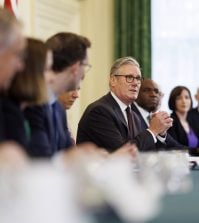‘True transformation requires leadership from the top’: reaction to Biden’s federal services reform plan

Response comes after president pledges to ‘prove government still works’ by improving citizen experiences
President Joe Biden’s plan to revamp federal services must succeed in order “curb the freefall of public trust in institutions”, a policy think tank has said.
In an analysis of Biden’s executive order aimed at streamlining the paperwork associated with a host of key federal services, the New America think tank highlighted that the president was “sending a clear message to the leaders of every agency to focus on people and improve their experience with their government”.
The order set out 36 commitments to improve customer experience across 17 federal agencies. It would require agencies to prioritise citizens by tackling inefficient services that it said impose a “time tax” on citizen.
“In recent years, the annual paperwork burden imposed by executive departments and agencies on the public has been in excess of nine billion hours. That number is too high,” it said.
“Too often, people have to navigate a tangled web of government websites, offices, and phone numbers to access the services they depend on. [This administration] is committed to ensuring an effective, equitable, and accountable government that meets the needs of its people.”
Many of the commitments focus on services that attend significant moments in the lives of citizens, such as having a child, financing post-secondary education, applying for a business loan, surviving a natural disaster, or reaching the retirement age. The High Impact Service Provider (HISP), a federal entity designated by the director of the Office of Management and Budget, examined the federal services that have a high impact on the public.
In a response to the plans, New America highlighted that “we aren’t going to change the way people feel about government until more people experience a functional, even pleasant experience interacting with the government”.
In an article published last week, Tara Dawson McGuinness, a fellow and senior adviser at the left-of-centre think-tank’s New Practice Lab and Hana Schank, director of strategy, for public interest technology, highlighted that “there is no solving the world’s hardest problems without governments and institutions that really work for people”.
The focus on 36 distinct commitments “establishes a process that holds agencies accountable not just for policy outcomes but also for the ways in which agencies meet people where they are at critical moments from turning 65 to having a birth to moving,” they highlight.
“And we must accelerate progress on bringing customer experience into the digital age if we hope to curb the freefall of public trust in institutions. We aren’t going to change the way people feel about government until more people experience a functional, even pleasant experience interacting with the government.
“Imagine a world where passports are easily renewed online, retirees can track the status of their benefits, and tax refunds automatically appear in bank accounts. Today’s order allows the federal government to begin rebuilding (or establishing) trust at a critical moment when Americans need government most.”
A statement by the White House released alongside the order said that “the president is making sure we’re building accountability and transparency into everything we do and that we’re good stewards of taxpayer dollars”, highlighting that Biden has said “we have to prove democracy still works, that our government still works and can deliver for our people”.
The order tells federal employees that every interaction between government and the public “should be seen as an opportunity for the government to save an individual’s time (and thus reduce ‘time taxes’) and to deliver the level of service that the public expects and deserves”. By demonstrating that its processes are effective and efficient, the Federal Government can build public trust, the order said.
“Further, the federal government’s management of its customer experience and service delivery should be driven fundamentally by the voice of the customer through human-centered design methodologies; empirical customer research; an understanding of behavioral science and user testing, especially for digital services; and other mechanisms of engagement.”
The executive order builds on the recent launch of Biden’s management agenda, some of the core priorities of which include delivering improved customer experience and funding vital services following COVID-19.
US federal government sets 2050 net zero target
The new order follows one last week that requires federal agencies to eliminate greenhouse gas emissions from their operations by 2050.
The order said that the government would aim to slash its emissions by 65% by 2030, achieving carbon neutrality by 2050. In a statement, the White House said the federal government would “leverage its scale and procurement power to lead by example in tackling the climate crisis”.
Under the requirements of the order, around 300,000 federally-owned buildings would be expected to achieve net-zero by 2045, and make a 50% cut to emissions by 2032. Government procurement decisions would also be expected to reach net-zero by 2050. The federal government meanwhile plans to transfer its 600,000-strong fleet of cars and trucks to electric power by 2035.
“As the single largest land-owner, energy consumer, and employer in the nation, the federal government can catalyse private sector investment and expand the economy and American industry by transforming how we build, buy, and manage electricity, vehicles, buildings, and other operations to be clean and sustainable,” the White House added.
“The United States government will lead by example to provide a strong foundation for American businesses to compete and win globally in the clean energy economy while creating well-paying, union jobs at home.”






















